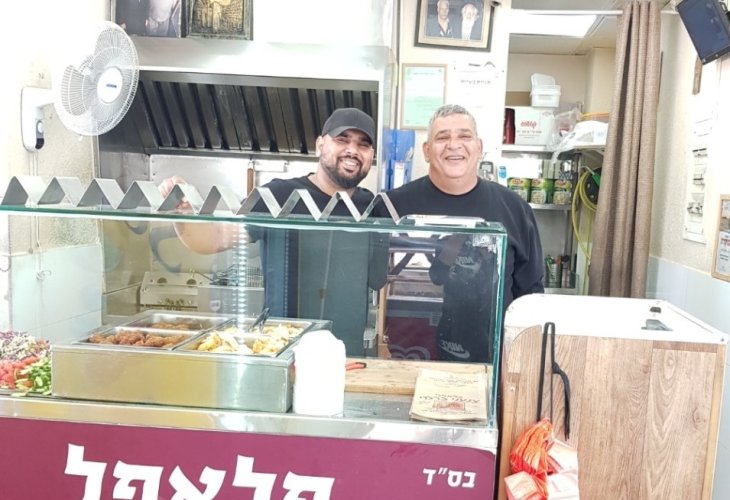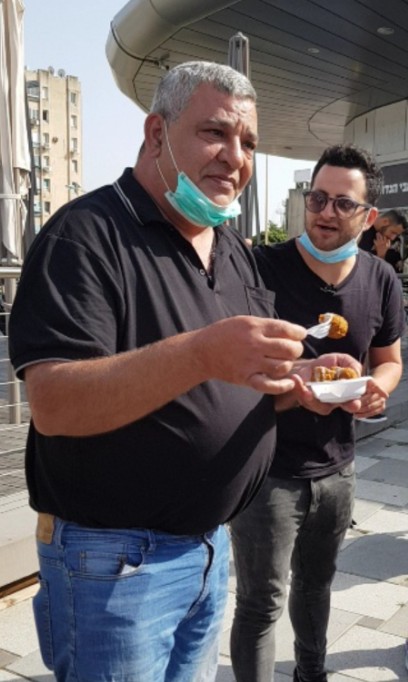Yuval Carmi's Falafel Stand in Ashdod: "I Don't Want Charity, I Want to Work"
Yuval Carmi, owner of the falafel stand that became a symbol of the struggle of independent business owners, shares his concerns for his employees, the empty shop, and his longing for customers. What did he say to the Prime Minister in a phone call?

Yuval Carmi is a falafel vendor from Ashdod who, in one day, became a symbol of the plight of independent business owners, simply by speaking the truth without any embellishments. "I am crying out the cries of all of us," Yuval tells me. "I don't want charity, I want to work. Let me work," he adds with great pain.
Yuval Carmi, a resident of Ashdod, owns the falafel booth in the 'Star Center' Ashdod. For the past thirty years, every day he has gone to his business (formerly in Kiryat Malachi) to serve the people of Israel. "My greatest joy is giving someone a hot and fresh falafel portion, in a Yemenite pita, crafted by the famous Tzanani Bakery, and seeing them enjoy it at a reasonable price. It makes me happy." When Yuval describes the pleasure of seeing a customer enjoy, he essentially explains why he is on the verge of collapse. "They told me, 'Do home deliveries,' but whoever told me that apparently doesn't understand how I feel. You can't deliver falafel by delivery, that's not falafel, it's something else."

We Support a Family
During the conversation with Yuval, it is evident he is still emotionally turbulent about the economic situation and the storm his words caused. "I have a wife and four children to support, to give them bread and milk in the morning. I don't know where to give it to them from. Additionally, I have four employees, some of whom manage households. My child and the kashrut supervisor, who has a family, also need to make a living. Meanwhile, all the other payments I must make remain the same. Thousands of shekels in rent for 26 square meters, electricity, water, taxes."
When did you stop opening the shop?
"It took me a long time to do it. When the corona began almost two months ago, everyone started closing their shops. I insisted and continued to arrive at the shop, but unfortunately, people didn’t come. I sat and waited for people, and at some point, I decided that's it, I’m closing. I closed. But after a week I felt the need to open the shop again. I brought back all the employees, and we waited for customers, but no one came. And don’t forget, it’s the hottest season of the year, right before Passover, people clean their houses for Pesach and don’t want to bring chametz into their homes, so they go out to eat falafel. But the desire not to bring chametz did not overcome the corona, and people simply didn’t come. It was hard to tell my employees to go home again, but I had no choice because there was simply no work."
This is Everyone's Outcry
Among thousands of businesses in exactly your situation, why did the media hear specifically your outcry?
"Last week, after Passover ended, ease-offs for the public were given, and two-by-two sales were allowed. I came to the shop to open. There was no possibility to eat at the place because it was against the health ministry's guidelines, so all the chairs were lifted onto the tables. After opening, the police came and saw a customer leaning on something and eating the falafel he bought. They told me that if I sell like this, I would have to close the shop. During this, I suddenly noticed Yaakov Halperin, the owner of Optika Halperin, who also has a store in the business complex where my shop is located. I went to him to thank him on behalf of all business owners for his assistance and support throughout the crisis. After thanking him, he said to me: 'So far I helped you, and now I want you to help me, are you willing?' I didn’t know what help he exactly wanted. Then he said, 'There is a Channel 13 crew here who came to cover the situation of the businesses, I want them to interview you.' I agreed. I waited in the shop until they got organized and arrived. The reporter and news presenter wanted to cover my situation and similar businesses. While I was telling her about the situation, I noticed she was very touched by my words, and following them, she began to shed a tear. I couldn't stand by, there was an emotional storm, and then I also started crying, it all burst out at once."
After Carmi's words were widely published in all media and created widespread public criticism, Prime Minister Benjamin Netanyahu saw the opportunity to deflect criticism away from himself and immediately embraced Carmi to his side, and now both are fighting the economic situation together. In every possible media, a video was published of the Prime Minister, as he calls Carmi, promising to help him and all the independents. However, beyond the words, there are no known different actions that have been taken that were not done previously.
Were you surprised by Bibi's call?
"I wasn't surprised because I was prepared beforehand that it would happen, but I was very excited. Not every day does an ordinary person talk to the Prime Minister. I am very happy I voted for him in the elections."
What did you say to him?
"I told Bibi that with all due respect to him being large and strong, even on an international level, to understand the little ones, you need to be small. Therefore, I suggested to him to appoint an adviser, someone from the people. Who sees the street, sees the small people, who just want food for their home, for their children. I hope he adopts my suggestion."
But the Prime Minister was not the first to call Yuval Carmi. The first to call were private individuals, who wanted to help Yuval in any possible way. When I ask Yuval about the people who offered to help, he tells me "All the honor to the people of Israel who want to give me and grant me, even from the United States people called me. But I don't want charity, I want to work, to enjoy the fruits of my labor. That's what I asked for."
Finally, Carmi tells me: "There were people who were begrudging of the resonance I created, and started spreading various lies about me. They said I have yachts, houses, properties, and that I'm not lacking money. I want to tell them that instead of the baseless hatred they create, I want to repay them with baseless love. I pray for them to have good all their lives, because as soon as they have good, they will want others to have good too. Thank you very much to the people of Israel who embraced me. Thank you very much to the army, the police, everyone. And I'm sorry I couldn't provide you the service you deserve. I'm sorry, those are the health ministry's guidelines. Hoping for healthier and quieter days."

